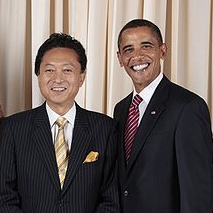It is downright striking how little attention the wider American discussion over foreign policy pays to Japan. After all, Japan still claims the title of the world's second largest economy (even if China is expected to overtake it next year). Its relationship with the U.S. has been as intimate as any other between major powers in the last 50 years. U.S. troops are still stationed there 64 years after the end of World War II. And to complicate matters, experts say there has been a longstanding worry on the Japanese side of being abandoned by the Americans.
Past American presidents have contributed to the problem. Bill Clinton literally flew over Japan on his way to meet with the Chinese leadership in Beijing. That didn't help. In the decade that preceded his rule, Japan-bashing had become a popular American pastime. It seemingly reached a peak with the publication of "The Coming War with Japan," a ludicrous book whose author had not used "war" as a metaphor.
Certainly, Japan was getting rich at the time, and it seemed they were getting stronger, to boot. But the reality was that Americans were getting needlessly worked up. In the early 1990s, Japan's bubble burst. The U.S. quit worrying about the supposed economic monster and instead turned to other matters -- such as Somalia, the Balkans, and spreading capitalism and democracy around the world.

